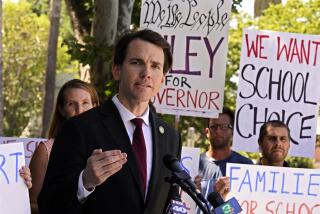FEC deadlocks on question of coordinated advertising
It all started when Sen. Ben Nelson, a Nebraska Democrat facing a potentially tough reelection fight next year, appeared in TV and radio ads discussing issues such as Social Security and the national debt.
The ads, it turned out, cost the Nebraska Democratic Party more than $600,000 -- well above the limit of what a political party committee can spend on a “coordinated” expenditure.
The Nebraska Republican Party called foul in a complaint to the Federal Election Commission, arguing that Nelson and Democratic officials exceeded the limits for “coordinated” spending and failed to properly disclose how the ads were paid for.
Democrats have contended that the Nelson ads don’t fall within the narrow definition of a “coordinated” expenditure, and instead termed them “issue” ads, which are not subject to the spending limits. That assertion was mocked last month by television satirist Stephen Colbert, who has made a personal crusade of pointing out the absurd complexity of campaign finance rules.
“Clearly an issue ad. The issue? Ben Nelson is pretty great,” Colbert quipped. “So I say bravo, Democrats. You are blazing a campaign trail to be followed by super PAC pioneers in their Conestoga money wagons.” (Watch the segment below.)
The ads also caught the eye of American Crossroads, a so-called super-PAC, which asked the election commission for permission to fund ads that “would be fully coordinated with incumbent members of Congress facing re-election in 2012 insofar as each member would be consulted on the advertisement script and would then appear in the advertisement.”
A super-PAC -- technically termed an “independent expenditure only committee” -- is a new type of political action committee that can accept unlimited contributions and spend unlimited amounts as long as that spending is not coordinated with a candidate or a candidate’s campaign. Crossroads argued in its petition to the election commission that the “fully coordinated” ads it proposed to air, like the ads aired for Nelson in Nebraska, would not technically meet the definition of coordination.
“Coordinated and not coordinated,” Colbert said of Republican operative and Crossroads co-founder Karl Rove. “He’s like a Zen campaign master asking, ‘What is the sound of one hand not washing the other?’”
On Thursday, the perpetually deadlocked FEC split on the issue, leaving it unclear whether Crossroads would run into trouble if it copied the Nebraska Democrats’ definition of an “issue” ad.
But Fred Wertheimer, who heads the watchdog group Democracy 21 and objected to the Crossroads request, said that if the Nebraska Democrat’s’ ads “meet the same criteria that American Crossroads spelled out in their advisory opinion [request], then we believe they’re illegal as well.”
“I mean, what Crossroads said ... is the following: We are going to fully coordinate with candidates, consult with candidates on the ads, and have the candidates appear in the ads. They then said, ‘We want these fully coordinated ads treated as uncoordinated ads,’” Wertheimer, who led the effort to enact reforms after the Watergate scandal of the 1970s, said Friday in an interview. “Our basic view is that groups cannot go around, have candidates consult on ads, have the ads include appearances by the candidate, and treat these ads as independent expenditures.”
kim.geiger@latimes.com
More to Read
Get the L.A. Times Politics newsletter
Deeply reported insights into legislation, politics and policy from Sacramento, Washington and beyond. In your inbox three times per week.
You may occasionally receive promotional content from the Los Angeles Times.










